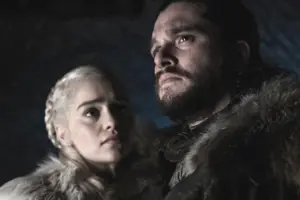From Avengers: Endgame to the Battle of Winterfell, is this weekend the apotheosis of geek culture?
-

"Even though I don’t expect us to abruptly move on from our current obsession with geek culture, it’s hard to imagine another week that will have this much conclusive weight to it," says Todd VanDerWerff of this weekend's finale to Marvel's Infinity Saga and Game of Thrones' Battle of Winterfell. "It feels like this whole pop culture moment has nowhere to go but down from here, like we’ll overdose on all of these big finales and need to start casting about for something else entirely. That combination of huge dramatic stakes, two major properties approaching their endings, and the sense of something having reached its height might be why we’re so focused on who’s going to die." VanDerWerff wonders if there is a greater significance to Game of Thrones and Marvel Cinematic Universe both being fascinated with death, as if they mirror our own existential angst on some levels: "Watch the first couple of episodes of Game of Thrones’ final season and Avengers: Endgame in rapid succession (as I did) and you’ll find yourself steeped in stories about characters who can see death coming — or have even seen death — and long not for glory or honor, but simply survival. These stories resonate with us in an era when saving the world increasingly feels like it might really require larger-than-life heroes...The Marvel films and Game of Thrones have vastly different answers to these questions, but that they’re both broadly centered on these sorts of themes — and attract such massive audiences at the same time — suggests they scratch an itch for viewers that isn’t being scratched elsewhere. There will inevitably come a time when this sort of geek-friendly pop culture slips out of the mainstream. And even if that’s years and years from now, it’s hard to see another release period quite topping this one for massive mainstream geeky success."
ALSO:
- Battle scenes are very boring: The Battle of Winterfell is expected to have the longest-ever battle sequence in TV and movie history, but "there are a few reasons incredibly long war sequences are bad," says Rebecca Jennings. "One of them is that most of the time, you have absolutely no idea what’s going on because the fighting is limited to male actors wearing 50 pounds of the exact same armor. Battle scenes often take place at night — and sometimes in the rain! — in order to make an already deeply bleak event even more depressing, which also has the effect of me knowing who precisely zero of the people fighting even are."
- Gwendoline Christie says Brienne's knighting scene "really spoke to me": "It operated on many different levels. A character that was good actually got something good for a change. And on a personal level, it really spoke to me. As someone that’s been very open about the struggles of my past, that many actors have had — and many people, full stop — about not fitting into a normal society. It’s being allowed, being credible, being given the incredible opportunity to play this part that I truly love, that’s true to me. It really touched me."
- Why Ser Brienne of Tarth deserves to survive: "In the new beginning to come afterwards, a knight of Ser Brienne of Tarth’s caliber could have an important role to play, redefining what true honor means in the wake of so much inhumanity," says Melanie McFarland. "Maybe the lesson at the end of it all is that while power rises, honor — true, humane honor — must prevail by necessity. And maybe all this time we’ve been looking at the wrong woman when we envision a queen fit to care for the realm."
- Could Daenerys Targaryen become Game of Thrones' ultimate villain?
- Why all the Game of Thrones reunions have felt so special
- Here are all the characters who should have sex before they die
- Meet the diehard fans who get Game of Thrones tattoos
- A neuroscientist offers a scientific take on white walkers
- Bran has to die for Game of Thrones to realize its most important themes
TOPICS: Game of Thrones, HBO, Gwendoline Christie, Marvel, Marvel Cinematic Universe
More Game of Thrones on Primetimer:- What is Sophie Turner hinting at with her cryptic message about “endings and beginnings”?
- HBO confirms a new Game of Thrones sequel series, with more projects now in development
- House of the Dragon season 3 eyes June after confirming Summer 2026 premiere
- Only Sansa Stark's character development makes sense during the Game of Thrones ending
